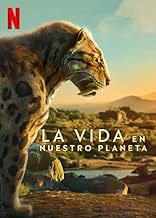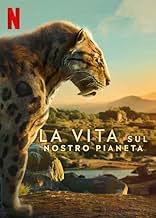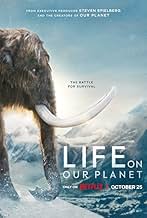Diese bahnbrechende Naturdoku zeigt, wie Lebewesen über Milliarden von Jahren imposante Eroberungs-, Anpassungs- und Überlebenskämpfe führten, um auf der Erde bestehen zu können.Diese bahnbrechende Naturdoku zeigt, wie Lebewesen über Milliarden von Jahren imposante Eroberungs-, Anpassungs- und Überlebenskämpfe führten, um auf der Erde bestehen zu können.Diese bahnbrechende Naturdoku zeigt, wie Lebewesen über Milliarden von Jahren imposante Eroberungs-, Anpassungs- und Überlebenskämpfe führten, um auf der Erde bestehen zu können.
- Hauptbesetzung
- Hauptbesetzung
- Für 1 Primetime Emmy nominiert
- 2 Gewinne & 14 Nominierungen insgesamt
Folgen durchsuchen
Empfohlene Bewertungen
It's visually beautiful and since Spielberg's name is attached to this series you can expect a visual spectacular which it is.
I loved every episode and as much as some complain the going back and forth during episodes to illustrate time periods this non linear change didn't bother me at all.
My only complaint..... I was expecting the full story of the human species just like they talked about every other species but they didn't it was like as if it was a second thought or ran out of time or funding. It was a very disappointing end to say the least. The final episode barely had 20 minutes of human species discussion.
I was left wanting more and there for was disappointed. But besides that it is a good documentary. Morgan Freeman as usual is a legend narrator.
I loved every episode and as much as some complain the going back and forth during episodes to illustrate time periods this non linear change didn't bother me at all.
My only complaint..... I was expecting the full story of the human species just like they talked about every other species but they didn't it was like as if it was a second thought or ran out of time or funding. It was a very disappointing end to say the least. The final episode barely had 20 minutes of human species discussion.
I was left wanting more and there for was disappointed. But besides that it is a good documentary. Morgan Freeman as usual is a legend narrator.
I'm constantly asking "But how?" Millions of years go by and new species appear but there's no information on how. What species did it originally evolve from. The answers are provided for our current animals which I already know and yes it's evolution of course but I want more details on the process. I want more science but maybe it's just me. It's very vague but I'm on episode one so hopefully they'll provide more entail but I doubt it. A massive squid appeared but no info on its structure and what caused it grow such a long cone head. Then it mentioned another squid that's hidden under sand, referring to its large eyes being able to see prey. Large eyes? That's all?!? Just the size?!? Psshhh.
It was entertaining enough but for me it was a slightly dissapointing. There was hardly any mentioning as in wich era or epoch the events took place. The millions of years are mentioned but not if it was the Silurian or the Carniferous or Plioceen, to name a few. Furthermore there were too much images of modern animal life. The prehistoric life was ofcourse GCI but I've seen better in BBC documentaries. Morgan Freeman does a good job narrating this series but he is certainly no David Attenborough. All in all it was a good production but could've been better and even great if they showed more prehistoric life and less contemporary ones in this tale of the evolution of life on earth.
Although I was a little disappointed by the quality of the CGI compared to prehistoric planet, it is very fulfilling to have a longer period and many more types of species covered. I am very excited about that. I also like that they connect the continental context, and the atmosphere with the life that existed.
I don't know enough to state the extent of how accurate or not the depictions are as the other reviewers mention, so I'll leave that up to the palaeontologists.
However, it does a great job in exciting us viewers for the amazing history our planet has. Morgan Freeman's voice is very calming and relaxing.
I don't know enough to state the extent of how accurate or not the depictions are as the other reviewers mention, so I'll leave that up to the palaeontologists.
However, it does a great job in exciting us viewers for the amazing history our planet has. Morgan Freeman's voice is very calming and relaxing.
Reeding alot of negative reviews here I had to add my opinion.
In was truly touched with this series, teers in my eyes, thinking about it for months after and opening up a whole new world for me. The music is so well made: dramatic en building up, with melodic themes coming back again and again (like star wars). This repetitiveness is also seen on the screen, where the rules of life explained in the first episode, and then shown in effect again and again. I mean this positively: these rules of life is what the series really is about, and this repetitiveness (with small adaptions) is what evolution basically is (very very roughly).
The serie is telling a story about our planet being (so far we know) unique in its ability to enable this life, but also the complete brutality of it, where only the most adapted survives, and even then mass extensions resets the stage, over and over again (in the series the 5 biggest are shown). For me, before this series, always boring to read about, but this has changed now.
Alot of people compare the serie with walking with dinosaurs, prehistoric planet and a planet earth. A very strange comparison: This series is not about dinosaurs. This is not a nature documentary to watch when having a hangover to relax. This series is also not aka National Geographic where it will zoom in and explain a specific topic with alot of detail.
No! This series will inspire you, with all its visual and musical power, to think about life itself, what it is, which rules it follows, and how miraculeus it is. And: how fragile, It can be all over within one day (at least for us humans). It will inspire you to broaden your knowledge afterwards about these time periods; about the Devonian, where the first amphibians came to land (long after the insects and plants), about the carbonian where newly evolved reptiles started laying eggs and as a result becoming less dependent on being near water; about the advantages and disadvantages of being warm blooded vs cold blooded; about being at the bottom of the food chain and then suddenly at the top and then at the bottom again. The series makes some assumptions but that is ok, with such a broad scope and so much tot tell, I understand these decisions.
This series is about life itself, and you have to pay attention.
If you want dinosaurs and relax this is not for you.
If your want to be inspired, find love and passion for biology: watch!
In was truly touched with this series, teers in my eyes, thinking about it for months after and opening up a whole new world for me. The music is so well made: dramatic en building up, with melodic themes coming back again and again (like star wars). This repetitiveness is also seen on the screen, where the rules of life explained in the first episode, and then shown in effect again and again. I mean this positively: these rules of life is what the series really is about, and this repetitiveness (with small adaptions) is what evolution basically is (very very roughly).
The serie is telling a story about our planet being (so far we know) unique in its ability to enable this life, but also the complete brutality of it, where only the most adapted survives, and even then mass extensions resets the stage, over and over again (in the series the 5 biggest are shown). For me, before this series, always boring to read about, but this has changed now.
Alot of people compare the serie with walking with dinosaurs, prehistoric planet and a planet earth. A very strange comparison: This series is not about dinosaurs. This is not a nature documentary to watch when having a hangover to relax. This series is also not aka National Geographic where it will zoom in and explain a specific topic with alot of detail.
No! This series will inspire you, with all its visual and musical power, to think about life itself, what it is, which rules it follows, and how miraculeus it is. And: how fragile, It can be all over within one day (at least for us humans). It will inspire you to broaden your knowledge afterwards about these time periods; about the Devonian, where the first amphibians came to land (long after the insects and plants), about the carbonian where newly evolved reptiles started laying eggs and as a result becoming less dependent on being near water; about the advantages and disadvantages of being warm blooded vs cold blooded; about being at the bottom of the food chain and then suddenly at the top and then at the bottom again. The series makes some assumptions but that is ok, with such a broad scope and so much tot tell, I understand these decisions.
This series is about life itself, and you have to pay attention.
If you want dinosaurs and relax this is not for you.
If your want to be inspired, find love and passion for biology: watch!
Wusstest du schon
- WissenswertesCGI effect sequences were done by Industrial Light & Magic or ILM, the same company that created the computer effects of the Jurassic Park and Jurassic World film series. According to paleontologist Bhart-Anjan Bhullar, a scientific consultant who worked with the ILM team, some of the animal models seen in the series could have been based on those seen in the Jurassic World films, albeit heavily updated to resemble real prehistoric animals rather than movie monsters. Bhullar suggested that ILM was aware that the Jurassic films had a mixed reputation among paleontology enthusiasts because the creatures seen in the films were not designed to be scientific (such as the oversized, scaly "raptors" that hark back to 1970s and 1980s depictions), so they tried to "get it right" with this series, and there was a lot of back and forth between the scientists and animators. Nevertheless, online paleo-communities have noted that some of the CGI animals presented in the series are still not up to 2020s scientific standards and feature odd mistakes like inaccurate skull shapes and body proportions. A few mistakes can be chalked up to science advancing while the series was being developed: the armored fish Dunkleosteus is shown with a long, slender body, though a 2023 study argued it would have been significantly shorter and more robust in life.
- PatzerIn one shot of the Arandaspis fish swimming near a reef, a scene supposedly set 475 million years ago when fish were just beginning to evolve, a present-day fish can be seen among the coral in the background.
Top-Auswahl
Melde dich zum Bewerten an und greife auf die Watchlist für personalisierte Empfehlungen zu.
- How many seasons does Life on Our Planet have?Powered by Alexa
Details
- Erscheinungsdatum
- Herkunftsland
- Offizieller Standort
- Sprache
- Auch bekannt als
- Life on Our Planet
- Produktionsfirmen
- Weitere beteiligte Unternehmen bei IMDbPro anzeigen
- Laufzeit1 Stunde
- Farbe
- Sound-Mix
- Seitenverhältnis
- 16:9 HD
Zu dieser Seite beitragen
Bearbeitung vorschlagen oder fehlenden Inhalt hinzufügen

Oberste Lücke
What was the official certification given to Leben auf unserem Planeten (2023) in Canada?
Antwort






















